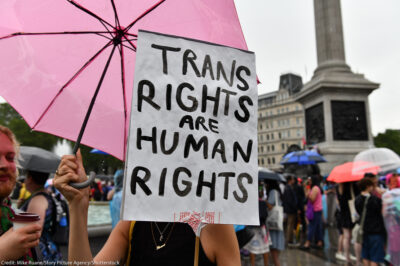New York High Court Hears Arguments in ACLU Case Charging Yeshiva University with Anti-Gay Housing Bias
FOR IMMEDIATE RELEASE
NEW YORK – The first lawsuit in the nation challenging anti-gay policies in university housing goes before New York state’s highest court today, as the Court of Appeals in Albany hears arguments in the American Civil Liberties Union’s lawsuit against Yeshiva University.
Like many universities nationwide, Yeshiva University offers subsidized housing for graduate students and their spouses. Also like many universities, Yeshiva requires that students be married to have access to this housing, thus excluding lesbian and gay couples – who pay hundreds of dollars a month in extra rent and commuting costs to live off-campus.
“Under policies like Yeshiva’s, 100 percent of straight couples have access to this housing, but zero percent of gay couples do,” said Matt Coles, Director of the ACLU Lesbian & Gay Rights Project. “Under any reasonable definition, that’s discrimination.”
The ACLU alleges that Yeshiva’s housing policy violates New York City law barring discrimination based on sexual orientation, as well as state law prohibiting marital status discrimination. Since Yeshiva is not a religious institution (with the exception of certain programs), attorneys for the university have not made any claims that the anti-gay housing policy has anything to do with religion.
The lawsuit was initially filed in 1998 against Yeshiva University and its Albert Einstein College of Medicine on behalf of two lesbian students and their partners, as well as the lesbian, gay, bisexual and transgendered student group at the medical school.
Two lower state courts ruled against the ACLU, finding that Yeshiva’s policy “had the same impact on non-married heterosexual students as it had on non-married homosexual students.” But those courts did not address the fact that same-sex couples cannot marry in New York or any other state.
“This case is not about securing marriage for same-sex couples or creating new laws – it’s about enforcing laws that prohibit discrimination against those who can’t get married,” said James Esseks, a partner at the New York law firm Vladeck, Waldman, Elias & Engelhard, who is volunteering with the ACLU on the case.
Today’s arguments before the seven judges of the Court of Appeals will focus on whether Yeshiva’s policy has a “disparate impact,” or causes a particular hardship, on lesbian and gay people. New York City’s civil rights law — like many around the country — prohibits policies that have the effect of discriminating against protected groups, as well as those that single groups out by name.
If Yeshiva prevails, a broad range of civil rights laws – including those protecting people of color, women and religious people – could be significantly weakened, Esseks said. Consequently, dozens of groups have filed amicus briefs with the Court of Appeals backing the ACLU, including the legal arms of the NAACP and NOW. New York State Attorney General Elliot Spitzer also filed an amicus brief with the court, citing the impact a victory for Yeshiva could have on his office’s ability to enforce a broad range of civil rights laws.
In addition to the direct impact the case will have in New York, the ACLU’s Coles said the lawsuit is spurring efforts to change similar policies at other universities nationwide. Comprehensive data do not exist, but the ACLU estimates that about half of the universities nationwide that offer couples housing discriminate against same-sex couples.
ACLU campus groups and LGBT student groups are actively working to change policies at UC Berkeley, University of Texas in Austin, University of Kansas in Lawrence, Iowa State University in Ames, Ohio University, University of Kentucky in Lexington and elsewhere.
“These policies aren’t just a political issue. They have a very real impact on the lives of lesbian and gay grad students,” Coles said. “Since this housing is partially subsidized, students who don’t have access to it and have to move off-campus end up paying much more in rent and commuting costs. Our clients at Yeshiva pay about $500 every month more than they would in campus housing — simply because they’re gay. ”
Stay Informed
Every month, you'll receive regular roundups of the most important civil rights and civil liberties developments. Remember: a well-informed citizenry is the best defense against tyranny.




